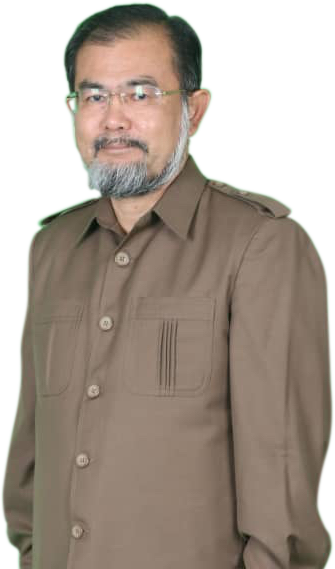Dr Mohd Nizam Mohd Ali, the Chairman of the Ethics Standards Board (ESB), has 30 years of career experience – 9 in an MNC, 5 in two National Master Franchises, 16 in a GLC alongside some personal attachments to 4 universities (as a BOD member, resource person and fellow) and 2 NGOs (Veteran VAT69 police commandos and alumni of MRSMs). He graduated with a Bachelor’s in Accountancy (Hons) and MSc. in Management from University Utara Malaysia and a PhD in (Ethical) Leadership from University Technology Malaysia.
Having found a lasting interest in the accountancy profession due to the trust placed by the public on the profession, he feels that it is indeed a meaningful position to be in because of this trust. In his free time, he enjoys reading and spending time in the wilderness.
What do you consider to be the highlights of your career and experience that would augur well in carrying out your role as the Chair of the Ethics Standards Board?
I once served in an MNC where the dos and don’ts are clear. Anybody who crosses the line is sanctioned without fear or favour, even those who are C-suite executives or JV partners.
I have also been in the entrepreneurial field where cheating, false promises and political patronage are commonplace. Nobody says anything if they want something only for themselves. Shut one eye and look the other way. Otherwise, your position and privileges are zilch at the blink of an eye.
I sought optional retirement from a GLC after spending half of my professional life in such organisations when governance was compromised, and integrity became mere lip service. I stood up to one politically exposed person’s whimsical dream to work the system instead of blowing the whistle even after the global sanction was initiated.
Perhaps these chequered lines shape my conviction that an accountant must be accountable lest no one will take him or her as credible. My teachers taught me that ethical integrity by definition is ‘being true and honest to oneself’. Should one cross the drawn lines, be duly compromised, or prefer dumb cowardice over virtuous courage, then one loses the trust of others even if nobody knows.

One of MIA’s strategic objectives is to nurture professional values and ethics of members to uphold a strong accountancy profession. What is the vision and the direction of the Ethics Standards Board in realising this strategic objective?
The ESB has been around for quite some time but may still be unknown to MIA members. The ESB must engage members more often and speak up louder on issues of ethical challenges to the public at large. We cannot just rest on our past laurels but rather continue to play our role better. Ethics is an applied philosophy. Thus, the ESB would do well to advocate the profession’s ethical values and demonstrate their application. Not everything boils down to dollars and cents but almost everything has to be said and done with good old common sense.
We have reviewed our ESB Terms of Reference and are hoping to welcome a larger, more varied participation from other fellow professionals and institutions. This will allow greater input from a wider group of stakeholders and exchange of viewpoints. While striving to be higher and better, accountancy as a profession should not grow insular but embrace mutual recognition and due acknowledgment by other professions.
The rotational nature of the Chair of ESB is a good practice. I joined the ESB during Eugene Wong’s (of Securities Commission Malaysia) tenure and learnt the ropes from Ravindran Navaratnam (of Minconsult Sdn. Bhd.). Our institutional friends that fill the roles of observers are also valuable contributors to our deliberations.
Please briefly share with us some recent salient developments in the ethics code included in the MIA By-laws of which members should take note.
In recent times, it has become more apparent that professional accountants play a vital role in businesses and for this they are scrutinised heavily by the wider public. The IESBA recognised this growth in significance and released the “Role and Mindset” revisions to the ethics code which in turn the MIA has also adopted. These revisions aim to help reinforce the responsibility that professional accountants have to always act in the public interest. The Code and by extension the By-Laws, now highlight that professional accountants are expected to comply with the spirit and not just the letter of the Code. All these changes are greatly welcomed by the ESB.
How can ethics be inculcated and nurtured in accountancy professionals not only at work but also in every aspect of life?
Start believing that ethics cannot be codified forever. At one point in life, one will have to be ethical in real terms, not simply on paper. This is especially so in our profession, as our calling card is accountability i.e. being able to put oneself to account. To be respected, trust must be earned and to do so one must be trustworthy first. Learn and read tomes of religious texts, philosophy, and statecraft, both ancient and contemporary, since therein are contained many nuggets of gold. Treat our belief systems and religions as one would one’s beating heart; once we forsake them, we die.
The student body in universities and interns at the workplace should be nurtured properly. Spend some time with them and share our experiences. Listen to their ideals and guide them on ethical precepts or practices that we observed during our professional duties. Junior PAIBs or PAPPs must be encouraged to take on different assignments to allow them to grow unto maturity in our profession. Network we must; never walk alone. Together we can arrive better.
How should ethical dilemmas be addressed at work? Do you have any practical experience and tips to share or pitfalls to avoid?
Any dilemmas should be dealt with in the strictest confidence and with due process diligently observed. Differentiate issues accordingly. At times they may be procedural, legal, or financial concerns, not necessarily ethical. The prevalent rules should be allowed to function. Trust the systemic checks and balances. Record every interaction or deliberation and protect its privacy. Manage the grapevine or office gossips by adhering to legal and formal ground rules.
I was once a GM of Operations and Finance tasked to set up a national master franchise business. Once, when my accountant came to me with her quarterly report and financial records, highlighting some discrepancies in paid-up capital subscription amongst the shareholders, I stood by her professional recommendations and immediately brought the case to the attention of the Board of Directors (BOD). The BOD Chairman decided to call for an investigative audit and hence, the case was referred to a CPA and substantiated by independent opinions, upon which the outcome was valid. No short cuts nor cutting corners. Always trust and stand by our fellow professionals, either PAIBs or PAPPs, as we know the high ethical standards that we live up to in our professional conduct. Keep our superiors in the loop at the onset, not in the end, of any suspicious transaction reports (STRs). Update our shareholders in material time. Never sweep anything under the carpet. If our professional judgments or fellow professionals are not respected, walk away from such an organisation or position. Our sanity and conscience must be held sound and clear.
What would you consider to be the hallmarks of a good ethical corporate culture in an organisation?
The ethical tone from the top must be clearly communicated across the board within the organisation. What the leaders say must be internalised by all and acted upon willingly. Mutual respect is key to ensure a healthy and open conversation takes place at all levels of engagement by all stakeholders. Any organisation of high repute maintains a certain degree of professional standards by which accountability is an expected duty that binds everyone regardless of their respective roles. A good culture of ethical conduct will emerge over time once these factors – clear communication, responsible leadership and high professional standards – are manifested.







